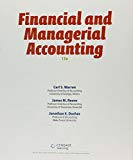
Deferrals:
Deferrals refer to the revenues that are collected in advance before the services are provided or sales are made to the customer, and the expenses are paid in advance before the expenses are incurred.
Deferrals are classified into two types. They are prepaid expenses, and unearned revenues.
Prepaid expenses: The expenses are paid in cash, before they are incurred.
Unearned revenue: The cash is received, before the services are performed.
Accruals:
Accruals refer to the revenues that are generated from goods delivered or, service performed to the customer, but cash is not yet received from the customer, and the expenses are incurred, but cash is not yet paid.
Accruals are classified into two types. They are accrued revenues, and accrued expenses.
Accrued revenues: Revenues are generated but not yet received in cash.
Accrued expenses: Expenses are incurred but not yet paid in cash.
To indicate: The types of adjustment for the given transactions.
Want to see the full answer?
Check out a sample textbook solution
Chapter 3 Solutions
Bundle: Financial & Managerial Accounting, Loose-leaf Version, 13th + CengageNOWv2, 1 term (6 months) Printed Access Card Corporate Financial ... Access Card for Managerial Accounting, 13th
- Adams Industries has a contribution margin ratio of 35%. The company is considering a proposal that will increase sales by $180,000. What increase in profit can be expected assuming total fixed costs increase by $42,000? A. $19,000 B. $10,100 C. $21,000 D. $5,000arrow_forwardI need guidance with this general accounting problem using the right accounting principles.arrow_forwardPlease help me solve this general accounting problem with the correct financial process.arrow_forward
- The selling price per unitarrow_forwardHarper Auto Parts started the year with total assets of $320,000 and total liabilities of $190,000. During the year, the business recorded $425,000 in revenues, $265,000 in expenses, and dividends of $45,000. What was the net income reported by Harper Auto Parts for the year?arrow_forwardCan you solve this general accounting problem using accurate calculation methods?arrow_forward
- I am looking for a reliable way to solve this financial accounting problem using accurate principles.arrow_forwardNeed answer general accounting questionarrow_forwardLast year the return on total assets in Calvin Electronics was 15%. The total assets were 4.5 million at the beginning of the year and 5.5 million at the end of the year. The tax rate was 30%, and sales were $8.2 million. What was the net income for the year?arrow_forward
- Need accounting questionarrow_forwardI am trying to find the accurate solution to this financial accounting problem with appropriate explanations.arrow_forwardTotal production of 3,500 units of finished goods at Tristar Manufacturing required 15,400 actual hours at $18.75 per hour. The standard is 4.2 hours per unit of finished goods, at a standard rate of$19.00 per hour. Which of the following statements is true?arrow_forward
- Principles of Accounting Volume 1AccountingISBN:9781947172685Author:OpenStaxPublisher:OpenStax CollegeCentury 21 Accounting Multicolumn JournalAccountingISBN:9781337679503Author:GilbertsonPublisher:Cengage
 Cornerstones of Financial AccountingAccountingISBN:9781337690881Author:Jay Rich, Jeff JonesPublisher:Cengage Learning
Cornerstones of Financial AccountingAccountingISBN:9781337690881Author:Jay Rich, Jeff JonesPublisher:Cengage Learning Intermediate Accounting: Reporting And AnalysisAccountingISBN:9781337788281Author:James M. Wahlen, Jefferson P. Jones, Donald PagachPublisher:Cengage Learning
Intermediate Accounting: Reporting And AnalysisAccountingISBN:9781337788281Author:James M. Wahlen, Jefferson P. Jones, Donald PagachPublisher:Cengage Learning




